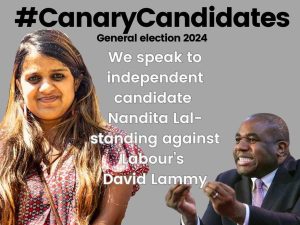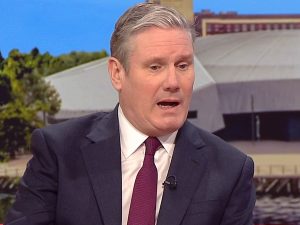Mayor Andy Burnham has slammed the brakes on Keir Starmer raising the bus fare cap in Greater Manchester.
Of course, there’s no small amount of irony that it was a Labour Party mayor showing up a Labour Party government for the short-sighted austerity-obsessed zealots they are.
Bus fare cap: Burnham slams the brakes on the Labour government
In the first Labour budget for over a decade, predictably, it’s all about hammering marginalised working class communities. On Monday, a smarmy Starmer set this in motion with the announcement the government would raise the bus fare cap. As the Canary’s HG reported:
At a speech in the West Midlands, the prime minister said that he will allocate £240m to roll-out services to help people get back to work. Meanwhile, he’s making it harder for poor people to get to work in the first place by increasing the £2 bus fare cap to £3
Invariably, the rising fares will hit poor people the hardest. Of course, with this neoliberal Labour government, it’s not anything surprising. But that 50% increase is going make bus journeys unaffordable to people already living on the breadline.
Obviously, the announcement was the car crash you’d expect. Politicians across the spectrum were levying criticism at the move.
One politician in particular – and a Labour mayor at that – took it one step further. Enter Greater Manchester mayor Andy Burnham.
Burnham put out a post on X to assure his residents that the combined authority would keep the £2 bus fare cap:
I can confirm that we plan to stick with a £2 cap on single bus fares for the whole of 2025.
More detail here.👇🏻 pic.twitter.com/NXgGoNPRKp
— Andy Burnham (@AndyBurnhamGM) October 29, 2024
Greater Manchester’s busy bus Bee Network
However, Burnham did temper this with the acknowledgement that Greater Manchester is in a unique position to do this. Why? Because in 2023, Greater Manchester took bus services back under public control:
This is what’s happening in Manchester…
(where public transport is franchised, of course)https://t.co/L3Qh4euyRW— Tristan Cork Post (@TristanCorkPost) October 29, 2024
It’s not nationalisation, because private bus companies still operate the services. However, it means the combined authority has control over fares, distribution of services, and who operates them, among other things.
This was possible due the Bus Services Act 2017. It gave mayoral authorities the power to franchise bus services.
So, as the Labour government lifts the bus fare cap, Burnham can step in for Greater Manchester’s bus services. In other words, thanks to bus franchising, the combined authority is in a position to keep the £2 fare cap, where other areas aren’t able to.
In September, transport secretary Louise Haigh announced new legislation to enable every council to do as Burnham has.
Someone pointed out that the Labour government could have waited to lift the cap until it had greenlit greater franchising across the country:
So Burnham can see the value.
Unfortunately much of England and most English cities lack powers to do this.
Starmer and Reeves *could* have kept £2 cap until extra powers and bus regulation in place. They havn’t. https://t.co/9Ete6AG5X6
— Murky Depths (@TheMurkyDepths) October 29, 2024
Privatisation of public transport = bus fare cap
Much of the problem then revolves around profiteering bus companies.
That is, Thatcher’s privatisation of bus services in the 1980s took the public for a ride – just not on accessible, affordable buses.
Instead, it greased the wheels of big private operators. Because like all privatised services, public money has propped up shareholder profits. In fact, an eye-watering 40% of bus operator revenue derives from public funding.
This includes local authority (LA) funding, reimbursement for concessionary fares, and national grant schemes. Moreover, it’s government and LAs that pay for bus lanes, shelters, and real-time passenger information.
In other words, they’re subsidising bus operators with infrastructure upgrades too. And during the height of the pandemic, the public purse kept bus companies afloat to the tune of £2bn.
Meanwhile, it has been peddle to the metal on shareholder dividends. In the decade up to 2019, the top four bus companies together accounting for 70% of bus passengers paid out an average of £149m to shareholders.
It has all meant soaring fares, fewer, and less reliable services for passengers. So, it’s the usual story: a racket on fares, serial underinvestment, and transport deserts in small rural towns where there’s less money to be made.
The cap has kept fares down from commercial rates. However, these companies shouldn’t be able to charge extortionate fares in the first place.
Steering buses back into public hands?
The fact is though, as it currently stands, nowhere can go full-throttle on full-scale nationalisation. That’s because, the very same 2017 Act also banned councils from setting up new bus companies.
At Labour’s 2022 conference, Louise Haigh – then shadow transport secretary – promised the party would overturn the:
ideological ban on communities establishing their own municipal bus companies.
Do we see a U-turn incoming? It seems likely from the party in bed with big business.
Reporting on the news, the Telegraph referenced a March 2024 report from consultancy titan KPMG. It produced it for the Confederation of Passenger Transport – the trade body that represents bus operators. Specifically, the article honed in on the cost of keeping the cap, and extending it at £3.
Tellingly, the KPMG’s report’s final line concluded:
Those who hold revenue risk should be able to control fares, whether that is the operator or franchise/tendering authority to support longer term efficiency and investment.
That is, the £2 fare cap hampers bus companies charging exorbitant fares and raking it in. Naturally then, privately, corporate bus operators likely want to see an end to this.
Maybe it’s coincidence, maybe it’s not, but this is of course, the same KPMG that has met with senior Labour figures multiple times in the past year.
Ultimately, the bus fare cap rise is yet more proof the Labour government isn’t the driver of “change” it boasted to be. Yet, while it’s gearing up to hit public transport users, the party’s mayor in Greater Manchester is bringing this to a stop there. He has shown what’s possible when you put public ownership behind the wheel, instead of parasitic private corporations.
One thing’s for sure, Starmer and co sure won’t be getting a welcome reception in 2029, when they roll-up in their battle bus. This is another disastrous policy the electorate won’t soon forget.
Feature image via Youtube – Bee Network




